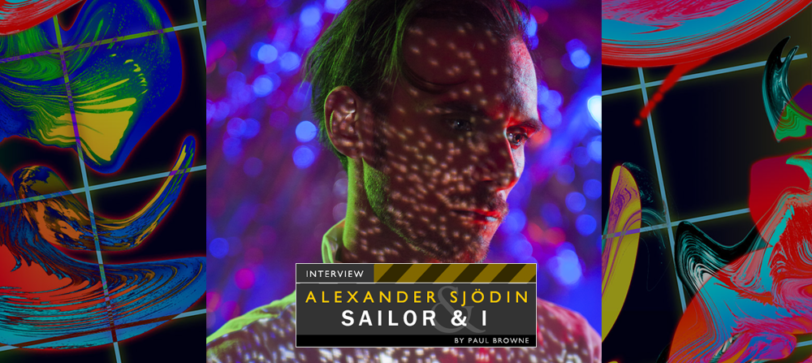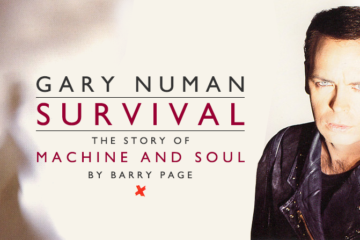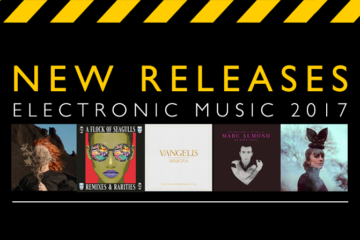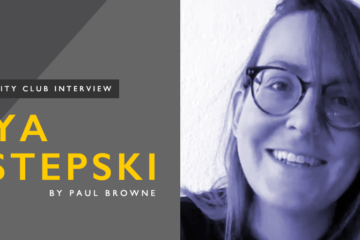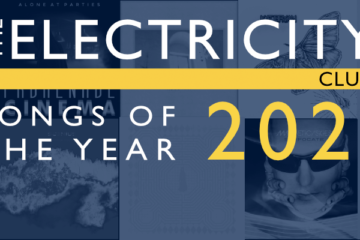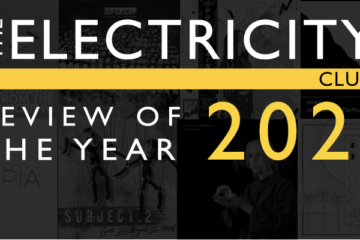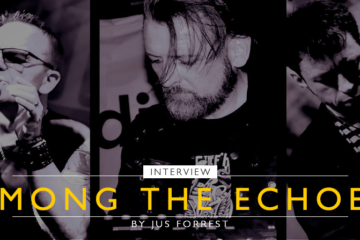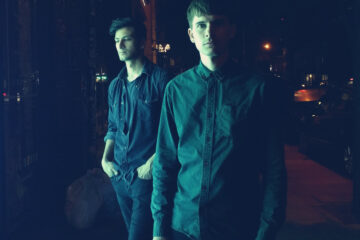The brooding, glacial pop of Swedish artist Alexander Sjödin, aka Sailor & I, had originally captured the attention of the electronic music scene via the glacial pop perfection of tracks such as ‘Black Swan’ and ‘Chameleon’.
Sjödin describes Sailor & I’s signature sound as “orchestras, analog synths, drums and vocals”, which is a nice summing up of the content of his debut album The Invention Of Loneliness (which we reviewed earlier this year).
Now with the release of the latest single from the album, in the shape of the moody rhythms and smooth synth melodies of ‘Rivers’ (which has also been remixed by Paul Woolford) and new live dates on the way, Alexander Sjödin took time out to chat to The Electricity Club about his music.
This included some conversation about favourite albums, which for the Swedish musician includes Spirit Of Eden by Talk Talk, Blood On The Tracks by Bob Dylan and Pet Sounds by The Beach Boys. Those choices of music perhaps illustrate what a broad canvas Sjödin draws from for his own compositions.
“I think it’s nice to have this diversity. A good album is always been well worked. Not like polished, but really engineered in an emotional way – and that’s tricky because sometimes you’re working with a gang of people who doesn’t see things the same way. So for me to record everything myself, most of the stuff is quite easy because I only have myself to like fight: ‘is this good? Is this talking to me?’”
On that basis, TEC delved into Sailor & I’s past, present and possible future…
Your childhood musical interests, which included the likes of Beastie Boys and Kiss, are quite diverse. Was there any particular band or artist that you feel had a direct bearing on the sound you’ve crafted as Sailor And I?
I had a lot of artists that were influencing me. Everything from Led Zeppelin to The Beatles. I listened a lot to The Beatles from when I was 10-years-old. I had periods where I only listened to music from the ’60s. I listened a lot to Jimi Hendrix. Especially guitarists because I started as a guitarist. I listened a lot to hard rock, like I was really into Iron Maiden, AC/DC. I had a few years when I would only listen to jazz music. I began listening quite intensely to Chet Baker because I love his melodies. He played such as simple way of bebop, almost minimalistic. His songs were so melodic. So I started to repeat his solos, but on guitar. That was a great way for me to understand how to keep things simple, melody-wise. Even if the chord changes – a bit crazy, like in jazz – you can always keep the melody going.
I remember when I began listening to Joni Mitchell, it was really like a big moment for me because Joni Mitchell, she had the melodies and she had her stories, like her divorce, the things she went through over 30 years. But especially the records from the ’70s are my favourite, Hejira, Court And Spark – she made a lot of great records. There were so focused on her vocals and melodies, but still the music was quiet complex. I think many people would find it quite hard to try and learn her songs because it’s quite complex. She’d detune the guitar in a certain way and made her own style. Even if you’re just listening in the background, it could sound like any singer/songwriter, but it’s so complex. So I’ve always been in love with the mix of this complexity of the musicality and the simpleness of telling a story with a melody.
It’s certainly a broad base of influences with very different sounds. So it’s less that you’re listening to these artists for the songs directly, more that you’re picking up how they arrange them and how they’re produced?
Yeah, but I think when I began composing my own music, I was very focused on melodies and lyrics and I never saw myself as a future producer. I’d heard so much, like: “You’re only a guitarist” or “you’re only the guy that writes the lyrics”. Because I came from a classical school context where everyone was the first instrument they learned in school! And then I just thought “OK, I’m not a producer, I’m a songwriter and I play guitar”.
Then back in 2006, I think, we began playing our songs together with friends. We formed a band, mostly to be able to try out our songs in a band context and we ended up just playing my songs and we didn’t have singers. I began to sing the songs and everyone was like “No, you can’t sing – we need to find a singer”. We never found a singer, so we just kept going with me singing and we never could find a producer who was willing to do it for the kind of budget we had It’s quite difficult when you’re starting out. Even if you have a few great songs, because we had quite good songs at the time, like ‘Turn Around’ and ‘Tough Love’ – they were all written a few years before that. ‘Turn Around’ was written 2002 and released 2014, exactly the same melody and lyrics. It was just a different kind of costume in terms of production.
So I began playing around with laptops and synths and tried to dress up the songs in a way that felt this is how I like the music to sound and, after a few years, it just felt like I’d found my own way of dressing songs. I just had to learn how to produce it.
“I wanted to develop all the time and when people began to remix my songs I started to learn electronic music”
Your sound has changed quite radically from the more orchestral arrangements on early tracks, such as ‘Tough Love’. Can you describe how the more recent sound of Sailor & I has changed over the years?
One reason was I kind of got tired of the orchestra sound. I wanted to develop all the time and when people began to remix my songs I started to learn electronic music. Because I was never interested in electronic music. All my friends were and I was always like, ‘No, it’s just boring beats, it’s the same thing every time. There’s no melodies, there’s no stories, it’s just for people who are high or drunk’. That’s because I never experienced good electronic music, in terms of the qualities I was looking for.
So when the remixes of my songs began to be played, I was getting bookings suddenly to techno festivals. So I showed up like the first time, it was actually in Istanbul, then I realised, like “Oh my God, I don’t know how to perform these songs in this context!”. There’s a DJ before me and after me and I’m going in here with strings and a completely different tempo than everything else. So I began playing around with how I could present my songs in a different way. And when I did it, I also began to be influenced by electronic music because I was surrounded by electronic music all the time when I played the show – or people I began to work with. Because quite early on I got the DJ guys who had released my music begin to ask me if could produce for them, record synths. At first I was like “Oh I can’t play synths” and I realised, of course I could play synths because I know theory and I’ve played all instruments all my life – and the DJ guys don’t even know what an instrument is! They don’t even know how the strings are working together! So then I got the confidence to say “OK, I can do this”. It’s just about… do what I really like. Listening to what I think is good. Just don’t care about what anyone else thinks. It’s not important.
A lot of your compositions bring in a wide range of sounds and also genres. ‘Flickering Lights’, for instance, was an attempt to bring together classical, house and electronica. Where does the songwriting process for you typically start?
A few years ago I was always starting out with a guitar and a melody and I wouldn’t want to start recording anything before the melody and lyrics were perfect in my mind. But then when I began playing around with synthesisers and beats and loops, things I created, then I found that the easy part for me was melodies and lyrics. So once I had an interesting vibe in a track I could just put that on and – Bang. So most of the time I do the vocals last. I focus on getting a nice vibe and then have the melodic structure and then I can just write and record the topline and then arrange it and then the song’s done.
“Once I had an interesting vibe in a track I could just put that on and – Bang”
So ‘Flickering Lights’ It’s basically just two parts, it’s two different chord changes. One that goes down and one that goes up. It took me very little time to produce the track because I had a piano I recorded and then I just added a few extra layers, like the arpeggios. Then I wanted to build it like crazy so I just had an old Prophet 1 synth, which I played around with the filters to make these strange sounds. So I just recorded it two times straight through and cut up the different parts that I liked and arranged it.
But some of the other songs, like ‘Black Swan’, I knew instantly that this is strong material, because I felt something when I recorded it. That topline took me maybe 5 minutes. Because I think Keith Richards said something like “All the songs are already written, you just have to pick them down, write them on paper” and I think that’s very true because the things we create… it’s something we already know, but we’re maybe haven’t been putting them into words before. But they’re already there in your mind somewhere.
So another question should be when do you decide a song is finished?
One way a song is finished as soon as you have a chord change and melody that creates a vibe, not matter how you produce it. Then it’s a song, people will recognise it. But the problem is, when is a production finished? And then it would be when it’s mastered, because then you can’t do so many changes. Because you don’t get the master on multitracks, you can’t cut into it. Then it’s more about arrangement. But I think a song is never finished, in some ways because a song can have many different lives, it can appear in different ways and that’s what I love about music, it’s never finished.
The tracks on The Invention Of Loneliness have this diversity of sound, so it makes for an interesting listening experience.
I was actually a bit nervous that the tracks were too different, like in the sounds I was using. Because I have never released or produced an album before. Once it was done and I listened through it as an album and not just as songs, it really made sense to me.
Much of your material can use what appears to be complex arrangements. Was it difficult to adapt this for live performances?
No, it’s very easy. Because most of the time when I play live I have like 8 tracks, I use Ableton, then I have 8 different tracks, like mixing tracks, where I make loops of different stems from the songs. Then I can live mix how the song would develop in terms of build up or build out or different parts of the songs that could come in and come out. It’s actually quite a good way to learn a song because once you’ve played around with it, that way you really know the strength, how you would feel it, in a certain way when you put certain things up in the mix. To make it euphoric, for example, I can just take these parts out and then put them in at once.
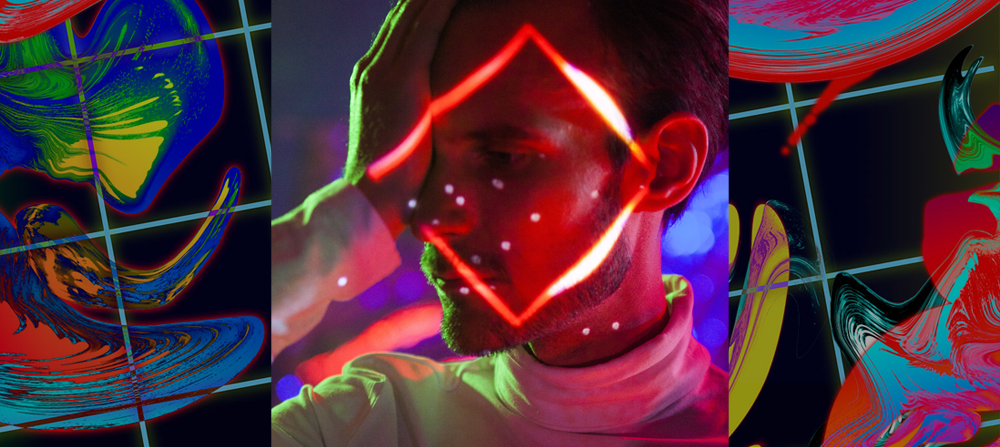
Your cover version of Joy Division’s ‘Disorder’ was quite radical. Why did you decide to cover that track in particular?
I had seen the documentary. That was when I really understood Joy Division, his songwriting and what he was going through. Before it was like, Joy Division was just a brand, like a brand for craziness, this dysfunctional person. Just like a brand, like Coca-Cola or something. But then I really understood Ian Curtis’ aura, at least I got a relation to it so I could connect to it – and then I really loved that song and melody and the lyrics. But I heard it differently because it was so up-tempo.
So I just began to sing it and play piano. It was so obvious, this is a beautiful melody. I hadn’t heard a cover that goes like that, so I just wanted to make it really icy and cold, like the Manchester winter – like in the film. So I thought it was a great song. It deserved to be recorded.
You titled your album The Invention Of Loneliness, what does that title say to you?
It’s complex to explain, because in one way it’s about me being like forced into making music to find myself and it’s quite a lonely process because I can only find the core of what I’m seeking by turning off everything around me. So that journey is quite lonely and it’s like every time I do it, I invent myself again to be able to find myself. Because it could be quite scary to be that open that I am exploring the deep emotional sides of my inner life. So I use music as a kind of meditation. I get into this mood where I turn everything else off and just run as far as I can every time.
I think you’ve mentioned in previous interviews that you often use your music as a form of escapism. Do you think that’s changed in you over the years?
Yeah. It has. Because at first I was very insecure. Like “Can I do this? Is this right? Is this wrong?” and it’s quite far from how I work when I’m not a musician, because I’ve always been open-minded. I was left by my biological mother when I was 6-months-old at an orphanage. I was adopted when I was 1-year-old and then, when I was 7, my adopted parents divorced. So my life has been constantly changing, my playground’s been changing all the time.
“I use music as a kind of meditation. I get into this mood where I turn everything else off and just run as far as I can every time”
And of course its still a process because making music is… you’re trying to solve a puzzle of many different things that comes to your mind, trying to understand what made you feel a certain way, where does this come from? Is this something that scares me? Then you need to turn toward yourself and be honest.
What’s next for Sailor & I?
I have a lot of things planned. I was actually going to release another album, but then I decided – together with the label – at the last minute that, let’s do this album first. Because I didn’t have an electronic album when we signed the contract with Skint. But then suddenly I have an electronic album. So I said “Can’t we just start putting out the electronic album? Because that’s where I am right now” and people would expect me to release ‘Tough Love’ and ‘Turnaround’ and those songs and I would rather not release them on the debut album because I’d already released them. It’s not where I am right now. And I had made the other album, almost 60% ready, so it was just a matter of completing, choosing the tracks because I have a lot of songs ready to be released. It’s like my obstacle is more about choosing what to release [and] when. To make my mind up, where I am at right now musically.
So right now I feel the next album would be a mix of this electronic thing I have with more acoustic drums and guitar. Less club-orientated, but still very electronic. It would work in a club, but not as much as this album. Then I would like to make the album I already started as the third album. Then the 4th album would be more… less elements, just a few instruments.
BUY NOW
So you’re really planning quite far ahead then.
Yeah, I hope to have 4 albums released within 3 years. But it depends. It needs to make sense to release an album. You don’t put it out just to be the guy putting out the most albums in the shortest time. I’ve been waiting so long for releasing albums, so I think it’s more about letting the people who are now beginning to explore me as an artist, to also let them be part of the journey. I don’t want to put out 4 albums otherwise. But the plan is to release the next album, maybe this fall or next year. But there will be an album out very soon.
What are your thoughts on the current electronic music scene and are there any contemporary bands or artists that you like?
I really like James Blake, especially as a live performer. I think he’s really great. I like the more experimental guys like Jon Hopkins and Max Richter and things like that.
But there is a lot of great music, a lot of guys who make interesting music. It’s funny because in the electronic scene, I find they’re not so mature as musicians, so sometimes they do really great things, but they didn’t really understand what they were doing. It’s quite hard for those guys to develop because they’re so focused on playing, so they don’t really have the time to develop as producers. So for me I would like to keep focusing on making music and take that into performing, not the opposite. And that’s tricky nowadays because you make money on performing, that’s like the main way to pay your bills – and that’s something you need to do every month! [laughs]
I might be naive but I think if you do something that’s different enough from what other people do, even if it’s not the trend at the moment, you make music, you tell a story and it connects with people, there’ll always be a market for that. And now we have the world as a market. It’s enough to be smaller, but you need to travel more of course to make everyone satisfied because eventually people want to hear you play.
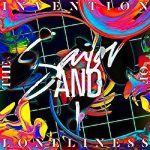 The Electricity Club extends its thanks to Alexander Sjödin.
The Electricity Club extends its thanks to Alexander Sjödin.
‘Rivers’ is available now to download/stream.
The album The Invention Of Loneliness is out now on Skint.
Sailor & I performs at The Great Escape 19th May (Tickets: http://www.ticketweb.co.uk/feature/thegreatescape/) and Leeds Town Hall 28th May (Tickets: http://www.seetickets.com/event/world-island/leeds-town-hall/1079165?src=c72e31dec18b0af2329b992ede88583c).
http://sailorandi.se/
facebook.com/sailorandi
twitter.com/sailorandi
https://soundcloud.com/sailorandi


